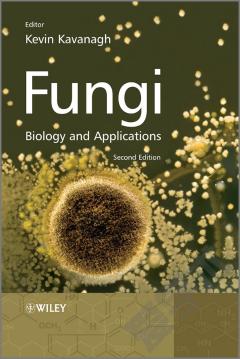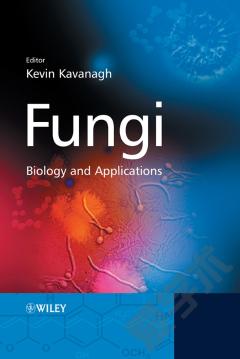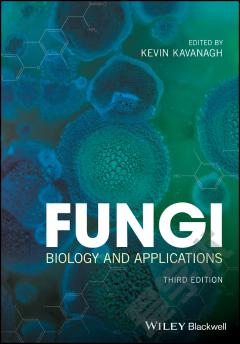Fungi —— Biology and Applications
----- 真菌:生物学与应用 第2版
List of Contributors. Preface. 1. Introduction to Fungal Physiology (Graeme M. Walker and Nia A. White). 1.1 Introduction. 1.2 Morphology of yeasts and fungi. 1.3 Ultrastructure and function of fungal cells. 1.4 Fungal nutrition and cellular biosyntheses. 1.5 Fungal metabolism. 1.6 Fungal growth and reproduction. 1.7 Conclusions. 1.8 Further reading. 1.9 Revision questions. 2. Fungal Genetics (Malcolm Whiteway and Catherine Bachewich). 2.1 Introduction. 2.2 Life cycles. 2.3 Sexual analysis: Regulation of mating. 2.4 Unique characteristics of filamentous fungi that are advantageous for genetic analysis. 2.5 Genetics as a tool. 2.6 Conclusions. 2.7 Further reading. 2.8 Revision questions. 3. Fungal Genetics: A Post-Genomic Perspective (Brendan Curran and Virginia Bugeja). 3.1 Introduction. 3.2 Genomics. 3.3 Transcriptomics and proteomics. 3.4 Proteomics. 3.5 Systems biology. 3.6 Conclusions. 3.7 Further reading. 3.8 Revision questions. 4. Fungal Fermentation Systems and Products (Kevin Kavanagh). 4.1 Introduction. 4.2 Fungal fermentation systems. 4.3 Ethanol production. 4.4 Commercial fungal products. 4.5 Genetic manipulation of fungi. 4.6 Conclusion. 4.7 Further reading. 4.8 Revision questions. 5. Antibiotics, Enzymes and Chemical Commodities from Fungi (Richard A. Murphy and Karina A. Horgan). 5.1 Introduction. 5.2 Fungal metabolism. 5.3 Antibiotic production. 5.4 Pharmacologically active products. 5.5 Enzymes. 5.6 Chemical commodities. 5.7 Yeast extracts. 5.8 Enriched yeast. 5.9 Further reading. 5.10 Revision questions. 6. The Biotechnological Exploitation of Heterologous Protein Production in Fungi (Brendan Curran and Virginia Bugeja). 6.1 Fungal biotechnology. 6.2 Heterologous protein expression in fungi. 6.3 Budding stars. 6.4 Methylotrophic yeast species. 6.5 Case study - hepatitis B vaccine - a billion dollar heterologous protein from yeast. 6.6 Further biotechnological applications of expression technology. 6.7 Conclusion. 6.8 Further reading. 6.9 Revision questions. 7. Fungal Diseases of Humans (Derek Sullivan, Gary Moran and David Coleman). 7.1 Introduction. 7.2 Fungal diseases. 7.3 Superficial mycoses. 7.4 Opportunistic mycoses. 7.5 Endemic systemic mycoses. 7.6 Concluding remarks. 7.7 Further reading. 7.8 Revision questions. 8. Antifungal Agents for Use in Human Therapy (Khaled H. Abu-Elteen and Mawieh Hamad). 8.1 Introduction. 8.2 Polyene antifungal agents. 8.3 The azole antifungal agents. 8.4 Flucytosine. 8.5 Novel antifungal agents. 8.6 Miscellaneous antifungal agents. 8.7 New strategies and future prospects. 8.8 Conclusion. 8.9 Further reading. 8.10 Revision questions. 9. Fungal Pathogens of Plants (Fiona Doohan). 9.1 Fungal pathogens of plants. 9.2 Disease symptoms. 9.3 Factors influencing disease development. 9.4 The disease cycle. 9.5 Genetics of the plant-fungal pathogen interaction. 9.6 Mechanisms of fungal plant parasitism. 9.7 Mechanisms of host defence. 9.8 Disease control. 9.9 Disease detection and diagnosis. 9.10 Vascular wilt diseases. 9.11 Blights. 9.12 Rots and damping-off diseases. 9.13 Leaf and stem spots, anthracnose and scabs. 9.14 Rusts, smuts and powdery mildew diseases. 9.15 Global repercussions of fungal diseases of plants. 9.16 Conclusion. 9.17 Acknowledgements. 9.18 Further reading. 9.19 Revision questions. Answers to Revision Questions. Chapter 1. Chapter 2. Chapter 3. Chapter 4. Chapter 5. Chapter 6. Chapter 7. Chapter 8. Chapter 9. Index.
{{comment.content}}








 京公网安备 11010802027623号
京公网安备 11010802027623号